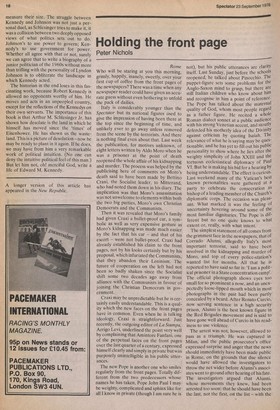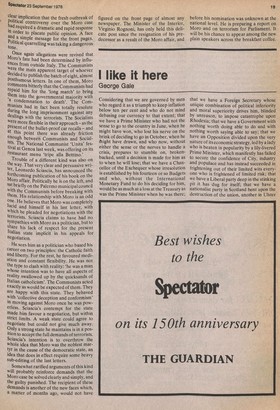Holding the front page
Peter Nichols
Rome Who will be staring at you this morning, grimly, happily, inanely, sweetly, over your first cup of coffee from the front pages of the newspapers? There was a time when any newspaper reader could have given an accurate guess without even bothering to unfold the pack of dailies.
Italy is considerably younger than the Spectator but its national figures used to give the impression of having been there at the top since the beginning of time, and unlikely ever to go away unless removed from the scene by the terrorists. And there is nothing final even about that. Last week the publication, for motives unknown, of eight letters written by Aldo Moro when he was a prisoner at the point of death reopened the whole affair of his kidnapping and murder. The process was helped by the publicising here of comments on Moro's death said to have been made by Bettino Craxi, the Socialist leader, to Mitterand, who had noted them down in his diary. The implication was that Moro's assassination was not unwelcome to elements within both the two big parties, Moro's own Christian Democrats and the Communists.
Then it was revealed that Moro's family had given Craxi a bullet-proof car, a symbolic as well as very expensive gesture as Moro's kidnapping was made much easier by the fact that his car — and that of his escort — were not bullet-proof. Craxi had already established his claim to the front pages, not by his looks certainly but by his proposal, which infuriated the Communists, that they abandon their Leninism. The future of cooperation on the left had not been so badly shaken since the Socialist shift some two decades ago away from alliance with the Communists in favour of joining the Christian Democrats in government.
Craxi may be unpredictable but he is certainly easily understandable. This is a quality which the new faces on the front pages have in common. Even when he is talking ideology, Craxi is straightforward. Just recently, the outgoing editor of La Stampa, Arrigo Levi, underlined the point very well by complaining that Amintore Fanfani, one of the perpetual faces on the front pages over the last quarter of a century, expressed himself clearly and simply in private but was purposely unintelligible in his public utterances.
The new Pope is another one who smiles regularly from the front pages. Totally different from the two predecessors whose names he has taken, Pope John Paul I may be weighty, complicated and sphinx like for all I know in private (though I am sure he is not), but his public utterances are clarity itself. Last Sunday, just before the schools reopened, he talked about Pinocchio. The puppet-figure sets some problems for the Anglo-Saxon mind to grasp, but there are still Italian children who know about him and recognise in him a point of reference. The Pope has talked about the maternal quality of God, whom most people regard as a father figure. He recited a whole Roman dialect sonnet at a public audience with his strong Venetian accent, and stoutly defended his motherly idea of the Divinity against criticism by quoting Isaiah. The relevance of what he is saying may be questionable, and he has yet to fill out his public personality to show where he lies after the weighty simplicity of John XXIII and the tortuous ecclesiastical diplomacy of Paul VI. But he is making his bid for a hearing by being understandable. The effect is curious. Last weekend many of the Vatican's best known personalities were gathered at a party to celebrate the consecration as bishop of a leading member of the Church's diplomatic corps. The occasion was pleasant. What marked it was the feeling of uncertainty hovering around some of the most familiar dignitaries. The Pope is different but no one quite knows to what extent or, really, with what intent.
The simplest statement of all comes from the grimmest face in the newspapers, that of Corrado Alunni, allegedly Italy's most important terrorist, said to have been involved in the kidnapping and murder of Moro, and top of every police-station's wanted list for months. All that he is reported to have said so far is: 'I am a political prisoner in a State concentration camp'. The official photograph shows eyes too small for so prominent a nose, and an unexpectedly loose-lipped mouth which in most photographs in the past had been partly concealed by a beard. After Renato Curcio, now serving sentence in a high security prison, Alunni is the best known figure in the Red Brigades movement and is said to have gone well ahead of Curcio in his readiness to use violence.
The arrest was not, however, allowed to pass as a triumph. He was captured in Milan, and the public prosecutor's office expressed surprise and anger that the news should immediately have been made public in Rome, on the grounds that due silence would have allowed the investigators to throw the net wider before Alunni's associates went to ground after hearing of his fate. The investigators argued that Alunni, whose movements they knew, had been arrested too soon: that he should have been the last, not the first, on the list — with the Clear implication that the fresh outbreak of political controversy over the Moro case had required a dramatic and rapid response in order to placate public opinion. A face and a simple message for the front pages. Political quarrelling was taking a dangerous tone.
Once again allegations were revived that Moro's fate had been determined by influences from outside Italy. The Communists were the main apparent target of whoever decided to publish the batch of eight, almost Posthumous letters. In one of them, Moro comments bitterly that the Communists had repaid him for the 'long march' to bring them into the governmental majority with a condemnation to death'. The Communists had in fact been totally resolute during the long imprisonment against any dealings with the terrorists. The Socialists were more flexible in their approach— as the Present of the bullet-proof car recalls — and at this point there was already friction enough between Communists and Socialts.ts. The National Communist 'Unita' festival at Genoa last week, was offering on its restaurant menu 'tripe alla Bettino.' Trouble of a different kind was also on the way. That very clear and persuasive writer, Leonardo Sciascia, has announced the forthcoming publication of his book on the Moro affair. Politically he is on the left, and sat briefly on the Palermo municipal council With the Communists before breaking with them. His relationship with Moro is an odd one. He believes that Moro was completely lucid and himself in his last letter, with Which he pleaded for negotiations with the terrorists. Sciascia claims to have had no Sympathies with Moro as a politician, but to share his lack of respect for the present Italian state implicit in his appeals for negotiation.
He sees him as a politician who based his career on two principles: the Catholic faith and liberty. For the rest, he favoured mediation and constant flexibility. He was not the type to clash with reality: 'he was a man whose intention was to have all aspects of reality swallowed up by the quicksands of Italian catholicism'. The Communists acted exactly as would be expected of them. They are happy with this state. They behaved With 'collective deception and conformism' in moving against Moro once he was powerless. Sciascia's contempt for the state made him favour a negotiation, but within strict limits. A weak state could agree to negotiate but could not give much away. Only a strong state he maintains is in a position to accept the full demands of terrorists. Sciascia's intention is to overthrow the Whole idea that Moro was the noblest martyr in the cause of the democratic state, an idea that does in effect require some heavy sub-editing of the last letters.
Somewhat rarified arguments of this kind will probably reinforce demands that the Moro case be solved clearly and simply, and the guilty punished. The recipient of these demands is another of the new faces which, a matter of months ago, would not have figured on the front page of almost any newspaper. The Minister of the Interior, Virginio Rognoni, has only held this delicate post since the resignation of his predecessor as a result of the Moro affair, and before his nomination was unknown at the national level. He is preparing a report on Moro and on terrorism for Parliament. It will be his chance to appear among the new plain speakers across the breakfast coffee.



































































































 Previous page
Previous page